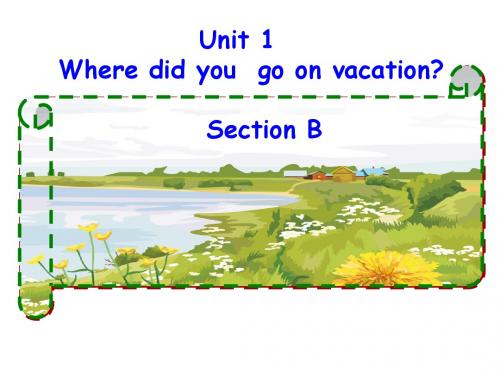人教版英语八年级上Unit1__SectionB
- 格式:ppt
- 大小:1.15 MB
- 文档页数:27

八年级英语上册Section B 短语Unit 1 Where did you go on vacation?【第一篇】1、arrive in 到达2、in Malaysia 在马来西亚3、decide to do sth 决定去做某事4、go to the beach 去沙滩5、try paragliding 尝试滑翔伞运动6、feel like 感觉像7、something special 一些特殊的东西8、in the afternoon 在下午9、ride bicycles 骑自行车10、many of the old buildings 许多老建筑11、the Chinese traders 中国商人12、100 years ago 一百年前13、 in the past 在过去14、enjoy walking 喜欢散步15、walk around 到处走走【第二篇】1、walk up to the top 走到山顶2、start doing sth 开始做某事3、rain a little 下小雨4、take the train 乘火车5、over an hour 一个多小时6、too many people 太多人7、rain hard 下大雨8、the bad weather 糟糕的天气9、enough money 足够的钱10、one bowl of rice 一碗米饭11、taste great 尝起来不错[译文]今天早上我和家人到达了马来西亚的槟城。
天气晴朗而且炎热,因此我们决定去旅馆附近的海滩。
我和姐姐尝试了滑翔伞运动,我感觉像一只鸟。
这太令人兴奋了。
午饭我们吃了非常特别的东西——马来西亚黄面。
它们很美味。
下午我们骑自行车去了乔治市。
现在那里有许多新的建筑物,但是很多古老的建筑物依然存在。
在海乾街,乔治市一个很古老的地方,我们看到了100年前中国商人的房子。
我想知道过去这儿的生活是什么样子的。

Unit1 SectionB〔1a-1e〕教案【教材版本与册数】新目的人教版八年级上册【单元名称】Unit 1 Where did you go on vacation ?【课时】SectionB 1a-1e〔第3课时〕【课型】Listening and Speaking〔听说课〕第 1 页第 2 页第 3 页第 4 页第 5 页附:教学活动设计第 6 页第 7 页第 8 页第 9 页第 10 页第 11 页第 12 页Exercise: Translate.1.下次放假,我想去香港。
听起来很有趣。
2.下次放假,我不想去雨中爬山了。
听起来真得很恐惧。
3.–丽萨,你的假期过得怎么样?-- 太棒了!我跟我家人去了香港。
-- 在那儿你干什么特别的事儿了吗?-- 是呀,我们去了一个有趣的公园。
Answers:1.On my next vacation, I want to goto Hong Kong. That sounds really interesting.2.On my next vacation, I don’t want to climb mountains in the rain. That sounds really terrible.3.-- Hi, Lisa. How was your vacation?-- It was great! I went to Hong Kong with my family.-- Did you do anything special there?-- Well, we went to a fun park.,根据结果反应,进展精准教学。
】再次为学生理清本堂课重点,小大局部学生根据老师提示能否回忆起本堂课内容。
第 13 页第 14 页3. Homework1〕.以“My Unforgettable Vacation〞为题, 写一篇短文。
2〕. Preview the new words and phrases.3〕. Preview Jane’s diaries .的可持续性评价。

英语八年级上人教版Unit1(SectionB)练习(含答案)一、根据句意及汉语提示补全句子1、根据句意及汉语提示补全句子(1)They will learn a lot from these ________(活动).(2)Can “________(鸟)flu” be treated now?(3)The ________ (商人) was truthful and without deceit(狡诈).(4)I ________(想知道)what that means.(5)Who would know the ________(差别)?(6)You carry an ________(伞). You watch the weather channel (频道).(7)My friend was ________ (饥饿的), so we drove to a shopping mall to get some food.二、英汉互译2、英汉互译(1)过得愉快________(2)决定去做某事________(3)去海边________(4)想要________(5)the houses of the Chinese traders ________(6)walk up to the top ________(7)take the train ________(8)because of ________三、按括号中的要求改写句子。
3、按括号中的要求改写句子。
(1)He went to summer camp on vacation.(改为一般疑问句,并作否定回答)—________ he ________ to summer camp on vacation?—No, he ________.(2)The bus trip started at six in the morning yesterday.(对画线部分提问)________ ________ the bus trip ________ yesterday?(3)We went to the Great Wall last month.(对画线部分提问)________ ________ you ________ last month?(4)The weather was sunny and warm last week.(对画线部分提问)________ ________ the weather last week?(5)Diana made great success in her research because she put her effort intoit.(改为简单句)Diana made great success in her research ________ ________ her effort.四、根据汉语意思完成句子。



八年级上册unit1Section B1. I arrived in Penang in Malaysia this morning with my family. 今天早上,我和我的家人到达了马来西亚的槟城。
➢arrive到达;抵达arrive作不及物动词,后接地点名词时,常与介词at或in连用arrive at后跟表示小地方的地点名词;arrive in后跟表示大地方的地点名词。
【例句】Call me when you arrive at the train station. 当你到达火车站时给我打电话。
【例句】They finally arrived in Beijing at seven in the evening. 他们晚上7点终于到达了北京。
arrive at+小地方arrive in+大地方【拓展】arrive, reach与get2. It was sunny and hot, so we decided to go to the beach near our hotel.(那里)天气晴朗且炎热,因此我们决定去我们旅馆附近的海滩。
➢decide意为“决定”,后接动词不定式,decide to do sth. 意为“决定做某事”。
【例句】He decided to go to Shanghai by plane.他决定乘飞机去上海。
【拓展】(1) decide后也可接“疑问词+动词不定式”或宾语从句。
【例句】I haven't decided where to go.(接“疑问词+动词不定式”)我还没有决定去哪里。
【例句】The Smiths decided that they would move to Dalian. (接从句)史密斯一家决定他们将搬去大连。
(2) decision是decide的名词形式,意为“决定”,常用短语make a decision 意为“做决定”。
姓名:班级Unit 1 Where did you go on vacation?Section B本课重点1.能运用be+形容词来评价事物2.会用一般过去时态叙述过去发生的事情3.不定代词的用法本课难点会用一般过去时态叙述过去发生的事情常考句型 1.We decided to go to the beach near our hotel.2.I really enjoyed walking around the town.3.How did you feel about the trip?4.I didn't bring back anything from Malaysia.5.My classmates told me to keep going.So I went on.6.Everyone jumped up and down in excitement.7.It was so beautiful that we forgot about the last five hours.一、单项选择1.It is nice ________ the gentleman to provide support ________ the poor.A.of, for B.of, with C.for, for D.for, with 2.We watch the TV play many times because it __________ quite funny.A.is B.seems C.tastes D.sounds 3.We stayed at home _____________ the heavy rain.A.instead B.instead of C.because D.because of 4.The box is ________ heavy for me ________ carry.A.too; to B.so; that C.such; that D.enough; that 5.—What did you do _________ your vacation?—I just stayed at home and relaxed.A.of B.by C.at D.on6.Our school pays much attention to the ______ of safety every term. A.development B.importance C.advertisement D.difference 7.—You came to Jinan yesterday. Why didn't I know?— I _______ calling you when I got here, but you didn't answer.A.wanted B.decided C.tried D.seemed8.—What are you going to give your mother for her birthday?—I'm not sure. But I'll buy her ___________.A.something special B.anything specialC.somebody special D.everything special9.Lily has a fever. She doesn't feel like ________ anything.A.to eat B.eating C.eats D.eat10._____go fishing with me this afternoon?A.Why don’t B.Why not you C.Why do you D.Why not二、完成句子11.你应该一直尽力尝试而不是放弃。
词汇点睛一、基础词汇1、活动2、决定3、试图、努力4、写5、自行车6、楼房7、想知道8、不同、差异9、顶部10、等待11、雨伞12、湿的13、在…以下14、足够的15、饥饿16、感受到17、如同18、鸭子19、不喜欢二、重点词汇讲解1、decidedecide为动词“决定”,常构成词组decide to do sth和decide on sth,其名词形式为decision,常构成词组make a decision to do sth(决定做某事)相当于decide to do sth, decide后面也可接从句。
decide后面还可跟“疑问词+动词不定式”结构。
Eg:I decided to find a part—time job.In the end, she decided on the red skirt.The little girl can’t decide what to do.2、try(1)try为动词“试图”、“努力”,常构成词组try to do sth和try doing sth,两者的区别在于try to do sth强调付出一定的努力设法去完成,而try doing sth则不一定付出很大努力。
Eg: I tried hard to improve my spoken English.(2) try还可以构成词组try one’s best to do sth尽某人全力去做某事。
Eg: We should try our best to practice speaking English.(3) try还可作句词“尝试”。
Eg:Let’s have a try.3、wonderwonder为动词“想知道”后面通常接从句。
Eg: I wonder who he is.4、differencedifference为可数名词“不同,差异”,其形容词形式为different,常构成词组be different from和…不同。